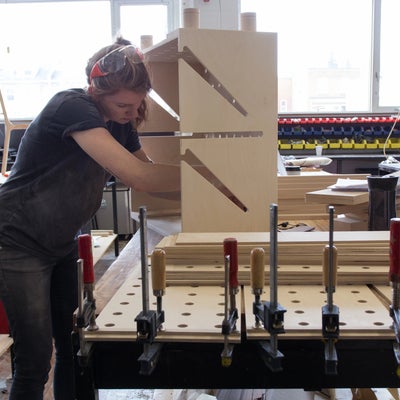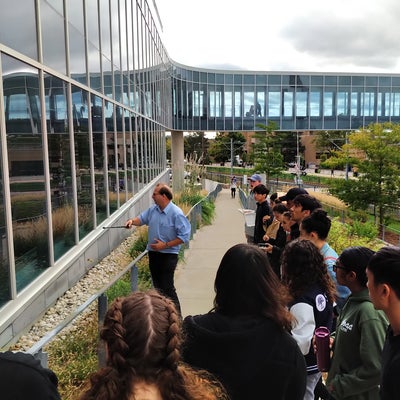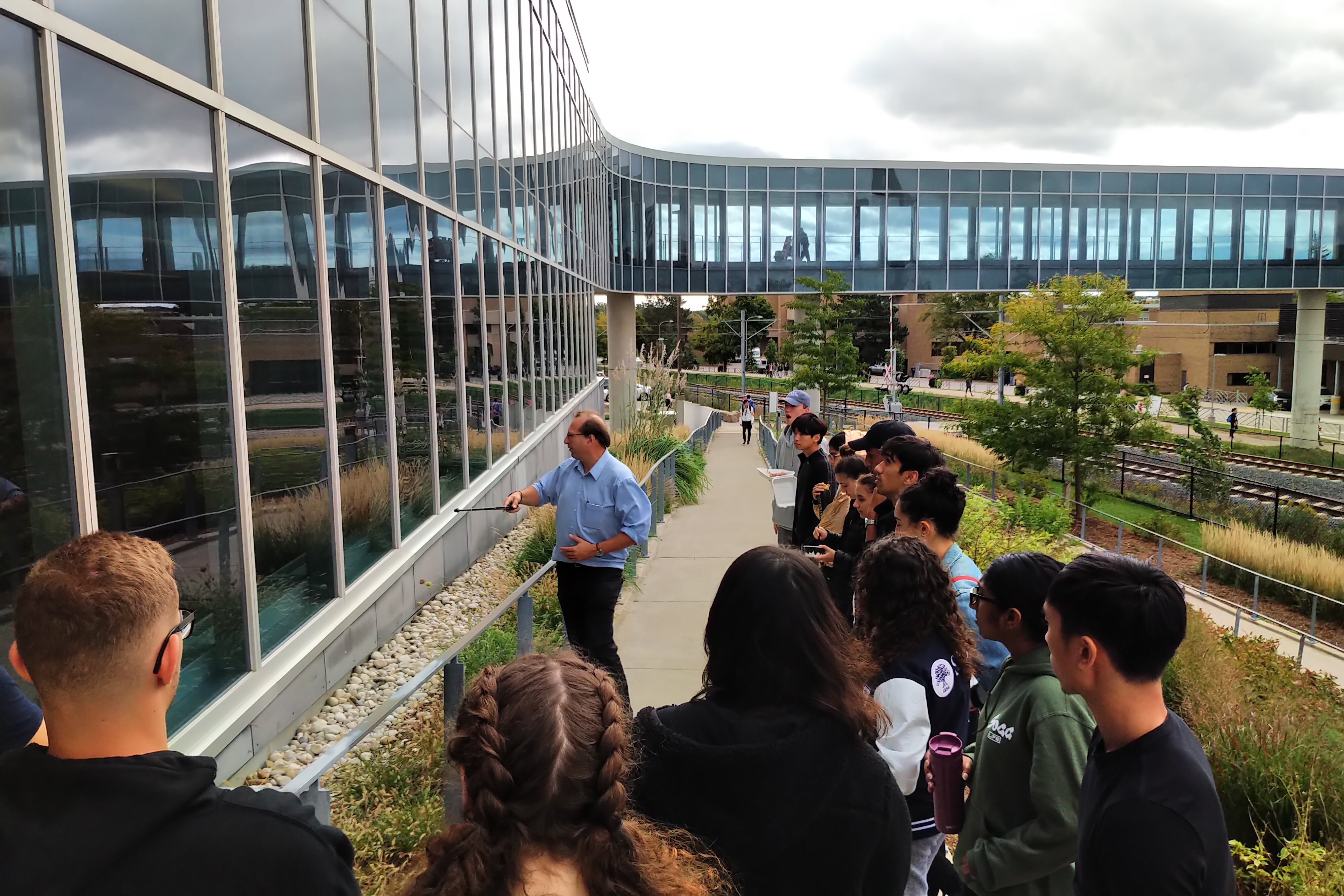Why Architectural Engineering?
Our Architectural Engineering program combines architectural design with building engineering to produce an engineer with the ability to picture the whole scope of building design, construction, assessment and refurbishment. This program aims to produce graduates who are equipped with the skills and knowledge to design, construct and maintain buildings that are sustainable, efficient and aesthetically pleasing. While covering the science and engineering that goes into good building design, you’ll learn how to communicate with precision and clarity – whether written, graphic or oral – and speak the language of engineers and architects.
The unique backbone of the Architectural Engineering degree is the Design Studio course which runs each term throughout your degree. Most studio projects are group-based, which allows for more significant projects while providing experience with collaboration and project supervision.
Courses in Architectural Engineering
You’ll take a mix of foundational engineering, chemistry, and math courses plus two design studio courses in first year. After first year, most of your classes will be Architectural Engineering courses covering topics such as structural analysis, energy and sustainability, solid mechanics and design and communication.
Sample first-year courses
This is a sample schedule. Courses are subject to change.
| Fall Term (September to December) | Spring Term (May to August) |
|---|---|
Upper year courses
For information about courses past your first year, check out the Undergraduate Academic Calendar.
Customize your degree with options and specializations
Options
Options are a way to provide you with a path to expand your degree and get a secondary emphasis in another subject or area. They are available to any student within the Faculty of Engineering (excluding Architecture). Students should decide if they are interested in taking options as they enter second year. Some available options are:
Specializations
A specialization is recognition of selected elective courses within your degree. Specialization offerings are unique to your engineering program and are listed on your diploma. Specializations that are available to Architectural Engineering students include:
Co-op for Architectural Engineering students
You’ll have an unrivalled opportunity to gain paid work experience before you even graduate. We’ll help you navigate job applications, résumés and interviews; you’ll have the added benefit of trying out different roles and/or industries to find the one that fits you while building your work experience and reinforcing your in-class learning out in the real world. It all adds up to a competitive advantage after graduation.
Starting in first year, you'll normally alternate between school and work every four months, integrating your classroom learning with real-world experience. You can return to the same employer for a couple of work terms to gain greater knowledge and responsibility or work for different employers to get a broad range of experience.
| Year | September to December (Fall) | January to April (Winter) | May to August (Spring) |
|---|---|---|---|
| First | Study | Co-op | Study |
| Second | Co-op | Study | Co-op |
| Third | Study | Co-op | Study |
| Fourth | Co-op | Study | Study |
| Fifth | Co-op | Study | - |
Your first work term will be halfway through first year. Learn more about co-op.
Example co-op positions for Architectural Engineering students
- Architectural Assistant
- Assistant Estimator
- Project Coordinator
- CAD Designer
- Building Science Intern
- Building Envelope/Structural Technician
- Field Engineering
- Junior Analyst
- Renewable Energy Student
Building a global architectural resume
Serena Zoe Valles, Architectural Engineering student
At her most recent firm in Denmark, Serena worked in the competition department. A developer will hold a competition and lots of different architecture firms will input a proposal. Serena's team helped put together panels and drawings to try to win the contract with the developer (they were successful).
Serena shared that "co-op gave me the chance to develop a good relationship in many firms, which is a great opportunity for future employment and networking."
Hear more about Serena's co-op journey as she shares how she took advantage of international co-op opportunities to build her architectural resume.

Careers for Architectural Engineering graduates
Architectural engineers have a versatile skill set that allows them to pursue a variety of careers in both the architecture and engineering fields. These roles often require a mix of creative and technical skills, and many architectural engineers work closely with architects, contractors, and other engineers to bring projects to life.
- Building systems engineer
- Structural engineer
- Construction project manager
- Facade engineer
- Sustainability consultant
- Building Information Modeling (BIM) specialist
- Building inspector
- Urban planner
- Lighting engineer
- Acoustical engineer
Capstone design projects in Architectural Engineering
Capstone Design is the culmination of the engineering undergraduate student experience, creating a blueprint for innovation in engineering design.
Supported by numerous awards, Capstone Design provides Waterloo Engineering students with the unique opportunity to conceptualize and design a project related to their chosen discipline.
A requirement for completion of their degrees, Capstone Design challenges students teams to push their own boundaries, and apply the knowledge and skills learned in the classroom and on co-op work terms. It reinforces the concepts of teamwork, project management, research and development.
For a full list of previous capstone design projects, see our Capstone Design website.
Tree of Life (Capstone 2025)

Richard He, Urooj Khan, Jessa Sookbirsingh, Emma White
Tree of Life is a youth vocational school in Cap-Haitien, Haiti that aims to break the poverty cycle by providing vital education and housing services for one of Haiti's most at-risk populations. Merging high performance North American technologies with traditional passive strategies, the project responds to an existing site that exhibits post-climate disaster characteristics to develop a design approach that could be implemented in our world of increasing exposure to such conditions.
Beyond Blox (Capstone 2025)

Julia Eisner, Tehreem Kashar, Stephanie Leaper, Keiara Raitt, Isabella Shin
The HEALiX is a modular, mobile healthcare clinic designed to provide services for underserved Northern Ontario communities' most pressing healthcare needs, including preventative care, women’s care, vaccines, mental health services, and diagnostic imaging. The HEALiX would stay in a location for 3 to 6 months, and this rotation concept would allow for a greater range of services to be provided, as the residential component of the clinic would be able to house nurses, physicians, and diagnostic specialists as needed.
Student design teams
The Sedra Student Design Centre consists of over 20,000 square feet of space dedicated to design teams and student projects. There are more than two dozen design teams, all of which are student-led, and many of which represent Waterloo internationally.
Some examples include:
Warrior Home

Warrior Home is a multidisciplinary student team that designs and builds high-performing, net-zero energy, affordable, and sustainable homes for community housing organizations.
F_RMlab

F_RMlab is a design and research collective engaged in advanced computational design tools in support of new paradigms of public space where dynamic interaction, social responsiveness, regenerative materials and systemic resilience are integral goals in building.
Engineers Without Borders

Engineers Without Borders (EWB) is an non-governmental organization committed to developing leaders with the skills and perspective necessary to create sustainable social change in local, national, and international communities, especially focusing on Indigenous communities within Canada.
Architectural Engineering alumni
Dominic Nguyen
For Dominic (valedictorian, class of 2024), the Architectural Engineering program at Waterloo was less than a year old when he first applied. “The program was a perfect mix of creativity and practicality that I had been looking for in a program,” Dominic says. “The collaborative group environments helped introduce me to some of my closest friends who were amazing in fostering a sense of community in my class.” One of the perks of being in the architectural engineering program was Dominic’s access to studio space for his cohort to work in and host informal events and hangout sessions.
Dominic plans on travelling for a bit before returning to his hometown of Toronto to begin his full-time role as an associate consultant for a construction claims consulting firm.







